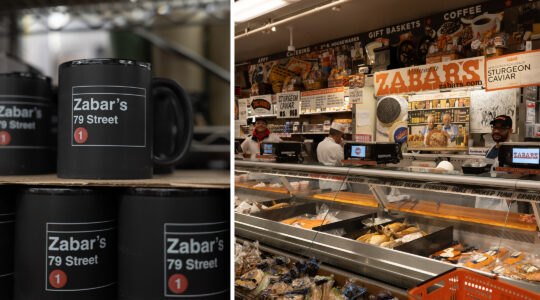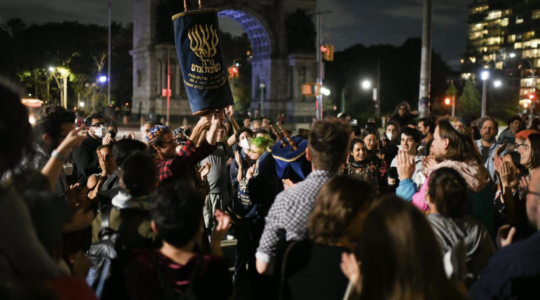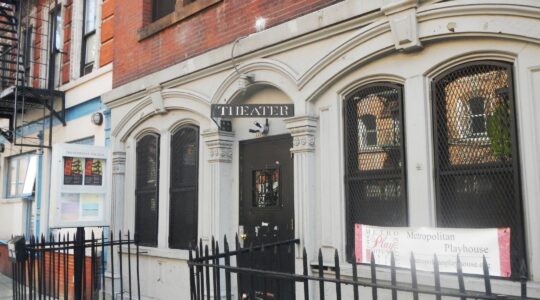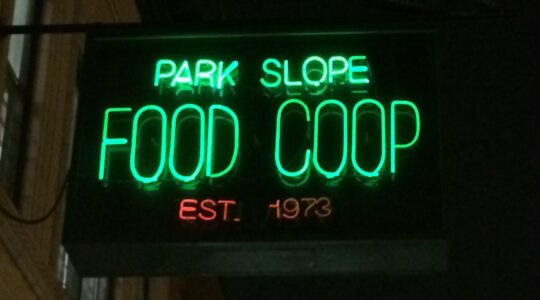Belfast — Behind the concrete walls and ongoing tensions that divide Catholic and Protestant populations, a tiny but lingering Jewish community read the Megillah and cranked groggers last Thursday here in the capital of Northern Ireland.
Capped in a golden speckled party hat, wrapped in a long black coat and sporting a characteristically chasidic beard, Rabbi Menachem Brackman, 26, led Purim services at the Belfast Hebrew Congregation.
Rabbi Brackman and his wife Ruth, 22, moved with their 6-month-old son to Belfast only five and a half weeks ago, to take over the rabbinical position vacated by Rabbi Avraham Citron. Part of the Chabad-Lubavitch movement, the young couple is beginning a six-month trial as a team in Belfast, before deciding whether or not they would like to be official Chabad shluchim (emissaries).
Although the Jewish community has been a fixture in Belfast for the past 150 years, the congregation has dwindled to 108 members, with sparse access to kosher foods and Jewish life. An estimated 200 to 300 Jews live in Northern Ireland.
“People will move away when their children get married — my daughter went to study in London and met her husband there,” said Harold Moss, 73, who wore a red plaid tam and a purple sweater vest as his Purim costume.
Yet the Brackmans were pleased with the evening’s turnout, a gathering of nearly 50 congregants. “I don’t know quite a lot of these people,” Ruth Brackman said, happily surprised to see so many people celebrating Purim together here.
“We’re keeping our expectations low,” her husband said. “It’s not just Purim — it’s getting accustomed to the new position.”
Among the participants that evening were longtime residents, recent immigrants from Israel and Professor Ari Goldman’s “Covering Religion” class from Columbia University’s Graduate School of Journalism. Rabbi Brackman whizzed through the Megillah reading at turbo speed, pausing occasionally to catch his breath. Jews and non-Jews alike clanked their noisemakers and banged on the glossy wooden pews every time he voiced Haman’s name.
“I enjoyed it,” said John Byrne, a Catholic Dubliner who has never been to a synagogue and the Columbia group’s tour guide. “It surprised me that it wasn’t a bit more reverential.”
After the service, congregants and visitors gathered in the lobby and hall attached to the sanctuary, where they shared hamantashen, coffee and conversation. Rabbi Brackman made his rounds dispensing shots of Scotch whisky and quietly disappeared to re-emerge as a full-feathered yellow chicken, to conduct a costume contest.
The few children attending the service flocked around the rabbi in their elaborate costumes, most notably Spiderman and a giant banana. Despite these scattered young faces, the average age in the synagogue is over 75, according to Edwin Coppel, 64, the chairman of the congregation.
Jews have been in Belfast since approximately 1850, with the first synagogue opening officially in 1904 and the second in 1964. Coppel has been a member of the community for his entire life and laments its continual decrease in population.
Support the New York Jewish Week
Our nonprofit newsroom depends on readers like you. Make a donation now to support independent Jewish journalism in New York.
“Unless we get the message out, we don’t get the support from our community,” he said. “It’s really a question of being more cohesive in our efforts.”
However, the congregation faces difficulties bringing the community together because potential members cannot attend services regularly, unless they drive to the synagogue.
“We live in Northern Ireland and come to all the festivals,” said Moira Jackson, who met her husband in Israel in 1980, where they both converted to Judaism. Her husband is a native of the Belfast area, and the couple and their two children have dual Israeli and United Kingdom citizenships.
Although the Jacksons always attend festivals at the synagogue, they are not yet full-fledged members, in part because they cannot walk to synagogue on Shabbat and High Holy Days. The family lives in Saintfield, some 12 miles away from the congregation, and they look forward to the times that they actually are able to attend services.
“It lets me touch base every time,” Jackson said. “I feel a lot better when I come out of here.”
They find sanctuary in a community where they aren’t a minority and can enjoy common traditions of generations past. Although they find very few Jewish people walking the streets of Belfast, the congregants rarely face anti-Semitism and feel that the majority population is very accepting of their culture.
“The Protestants and the Catholics were too concerned with each other to bother with the Jewish people — we were left pretty well alone,” Coppel said. But since the end of “the Troubles,” as Catholic-Protestant tensions are called here, the congregation has become involved in interfaith dialogues and even hosts council meetings between Jews and Christians. “If people can see you, at least they know you’re not walking around with horns,” he said.




